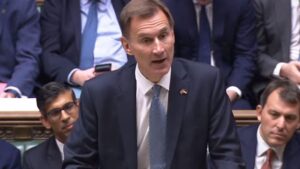
The chancellor has been handed a further pre-autumn statement boost as official figures this morning showed that the government borrowed £16.9 billion less than expected so far this year.
The government borrowed £14.9 billion in October, the second-highest figure for that month since records began in 1993 and above analysts’ expectations, according to the Office for National Statistics (ONS).
It means that the UK’s debt pile has increased by £98.3 billion in the present fiscal year, much lower the £115.2 billion that the Office for Budget Responsibility (OBR) projected by this time of the year at the March 2023 budget, strengthening the chances of Hunt launching tax cuts at tomorrow’s autumn statement.
Jeremy Hunt is considering using a fraction of a revenue windfall to lower income tax, national insurance or inheritance tax tomorrow.
Rishi Sunak, the prime minister, yesterday sent a strong signal that Hunt will reduce taxes. Sunak said that the government was now in a position “to turn our attention to cutting tax” after inflation fell faster than expected to 4.6 per cent last month, meaning the prime minister met his pledge of halving it this year two months early.
The chancellor said today: “We met our pledge to halve inflation, but we must keep on supporting the Bank of England to drive inflation down to 2 per cent. That means being responsible with the nation’s finances.
“At my autumn statement tomorrow, I will focus on how we boost business investment and get people back into work to deliver the growth our country needs.”
Hunt said yesterday that it was now time to focus on the “long-term growth of the UK economy” in the autumn statement after taking a more cautious approach to fiscal policy for the past year.
Stronger than expected tax revenues engineered by wage growth rising at a record pace this year amid rising prices has provided Hunt with anywhere between £15 billion to £25 billion to deploy at tomorrow’s fiscal event, which will be his third since becoming chancellor a year ago.
Income tax receipts have soared over the past year due to workers being pushed into higher tax brackets after receiving pay increases to compensate for rising prices, a process known as “fiscal drag”. The government has frozen income tax, and various other taxes, thresholds for several years, which will pull in an estimated £52 billion, according to the Institute for Fiscal Studies.
However, there are clear long-term challenges to the health of the public finances presented by higher interest rates raising the debt interest bill. The ONS said that the UK spent £7.5 billion on debt servicing costs in October, the largest for that month since records began in 1997. Analysts at Deutsche Bank said in a note to clients that the OBR will forecast in the autumn statement that annual debt interest spending will top £100 billion in each of the next five years.
Read more:
Lower borrowing bill gives Jeremy Hunt a boost before autumn statement





